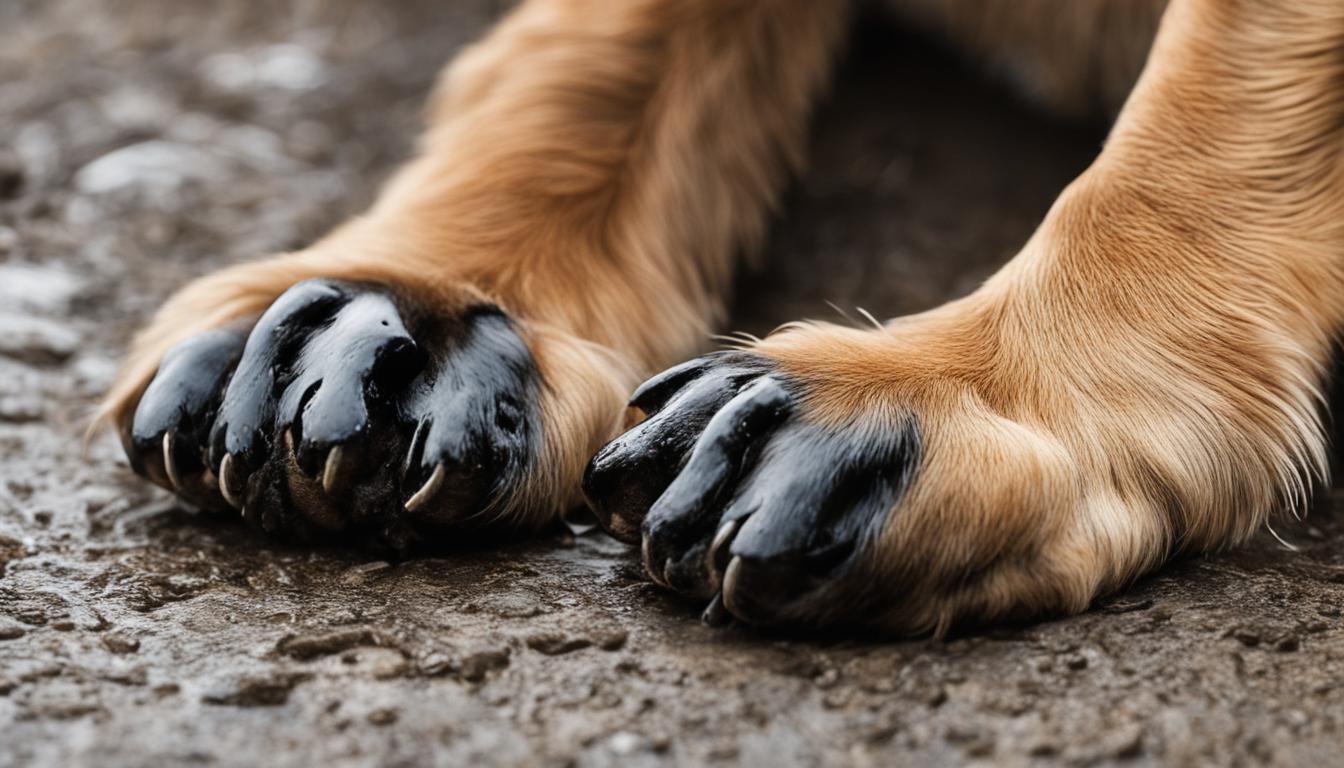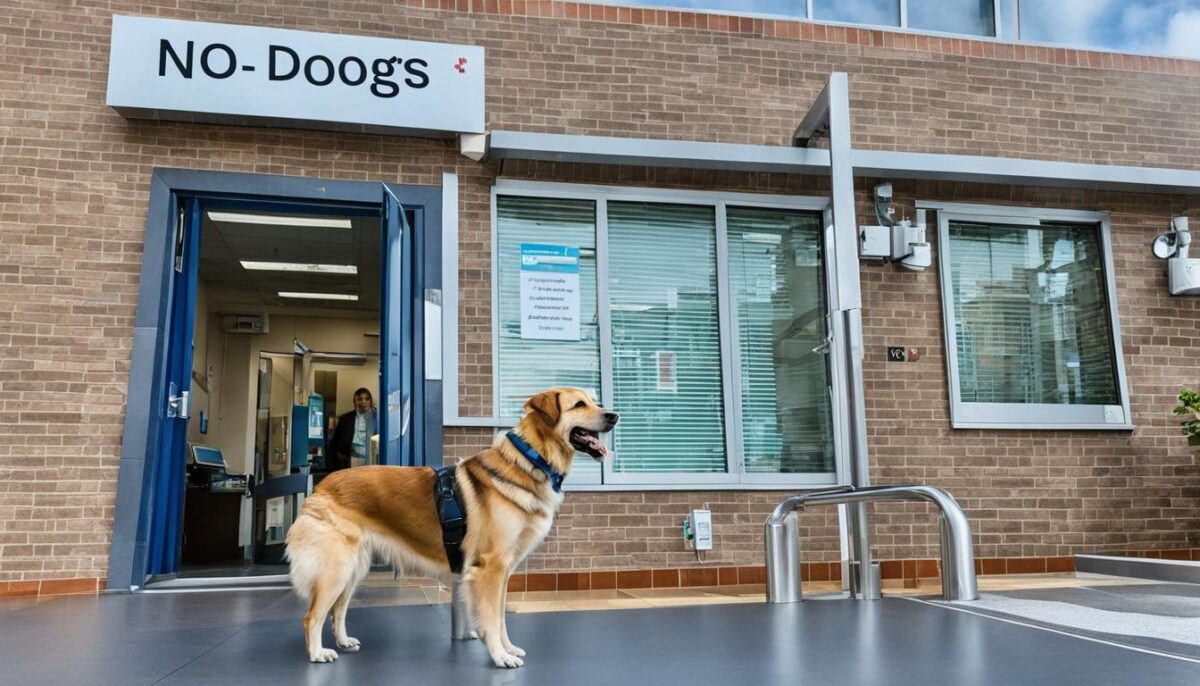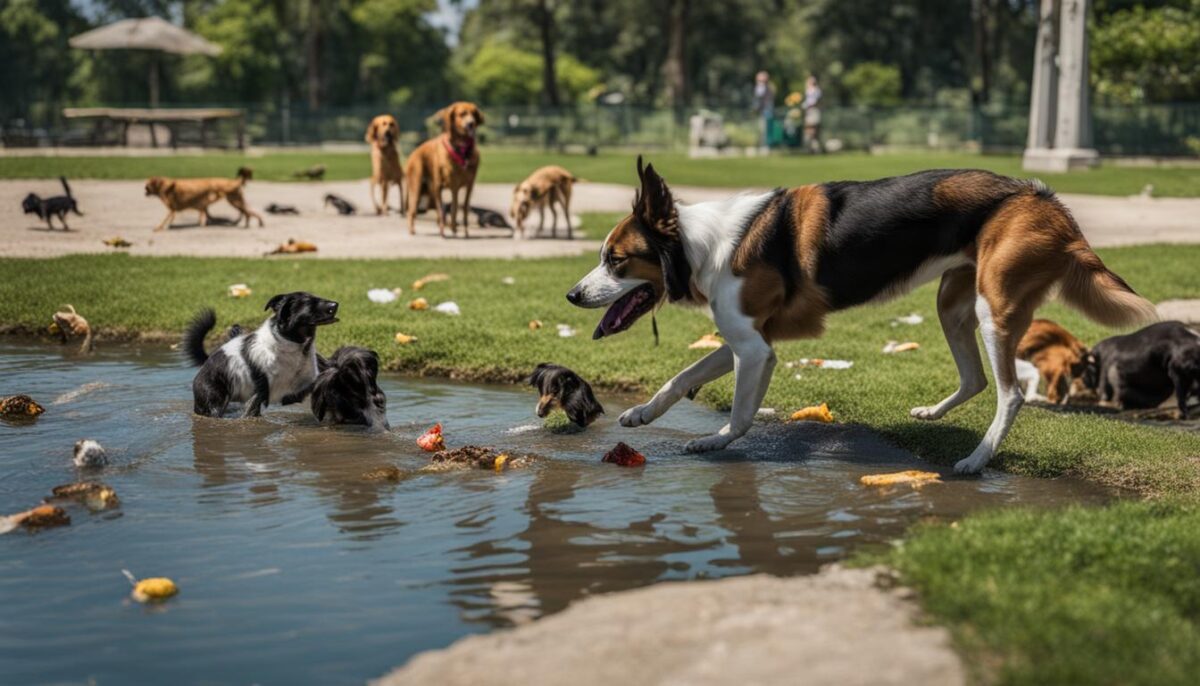Hey there! If you’re like many families in the United States, there’s a good chance you have a dog as part of your family. Dogs fill our lives with joy and we want to keep them healthy and happy. You may wonder if your furry friend can catch dog illnesses from you. This is called human-to-dog disease transmission. The idea of pet health risks coming from us might sound strange, but it’s a real thing. Still, it’s pretty rare for our pets to get sick from the same viruses that make us humans feel under the weather.
Even though we might get a flu bug, it usually doesn’t bother our dogs the same way. That’s because viral infections in dogs work differently. However, it’s always better to be safe. So, let’s dive in and find out what might affect our four-legged pals and how we can protect them.
Key Takeaways
- Dogs can sometimes get sick from humans, but it’s not very common.
- Most human colds and flu strains don’t usually make dogs ill.
- It’s important to keep our distance from our pets if we’re feeling sick to help protect them.
- Good hand washing is a great way to reduce the spread of germs to our dogs.
- Making sure dogs have their regular vet visits keeps them in top shape.
Understanding the Human-to-Dog Disease Transmission
When you catch a cold, you know to cover your coughs and sneezes to keep others from getting sick. But what about your furry friend? Can your dog get sick from you? Let’s find out about the sniffles and sneezes you might share with your pup.
The Common Cold and Canine Health
You might be surprised to learn that dogs can get a sort of cold, but it’s not the same cold you get. Dogs can suffer from something called kennel cough, which makes them cough a lot. However, human cold viruses are not the cause of kennel cough. So, if you have a runny nose and sore throat, you don’t need to worry about giving that to your dog. They may get their own colds, but they won’t be your fault!
Influenza: Human Strains vs. Canine Strains
What about the flu? This is where things get a little trickier. Dogs can’t catch every flu bug that you can. But a few kinds, like the 2009 H1N1 and H3N2 strains, can sometimes make dogs sick. Even if they catch these from humans, dogs don’t usually get as sick as people do. Thankfully, there’s special medicine for dogs if they do catch these flu bugs. It’s called the canine influenza vaccine and it helps keep them from getting the flu.
Protecting Your Pooch from Your Illness
Even if the chances are low, it’s still a good idea to be careful. When you’re feeling under the weather, try to keep a little space between you and your dog. It’s like when your mom says not to get too close to someone who is sick—same thing goes for your dog! Washing your hands a lot can help too. And don’t forget to take your dog to see the vet regularly. It’s like when you go for a check-up at the doctor’s office.
- Zoonotic diseases: Illnesses that can go from people to animals and back.
- Canine influenza: A flu that dogs can get, which is different from most human flus.
- Respiratory illnesses in dogs: Sick lungs and airways that can make dogs cough and wheeze.
- Preventing pet disease: Ways to keep your dog healthy and not catch your coughs and sniffles.
Can Dogs Get Sick From Humans?
Hey there! Have you ever cuddled with your dog when you felt a bit sick? Well, pet disease transmission isn’t very common, but it can happen. Dogs, like people, can get ill too. Sometimes dogs can catch human-to-pet illnesses. It is important to know about canine health so you can keep your furry friend happy and well.
Some sicknesses like the cold that make you sneeze and cough usually don’t get passed on to dogs. But, dogs can sometimes get other dog infection risks from their human pals. This includes some tummy and breathing problems caused by tiny germs called bacteria, like Salmonella and MRSA, or by viruses, like the one that caused COVID-19.
Good news! You can do a lot to make sure your dog stays safe from these germs. Washing your hands, keeping things clean, and visiting the vet can help a lot. So, next time you’re not feeling so good, remember to take care of yourself and your dog, too!
Bacterial Infections: A Two-Way Street
Both people and dogs need to take care when it comes to zoonotic bacterial infections. These are infections that can pass between animals and humans. Two common examples are Salmonellosis in dogs and MRSA transmission. Let’s look at how these can affect you and your furry friend.
Salmonella: A Shared Risk
Have you heard of Salmonella? It’s a nasty bug that can make both people and dogs very sick. It can cause fever, diarrhea, and throwing up. Dogs can get it from eating something bad, like spoiled food or even tiny bits of poop from other animals. People can get it the same way, so make sure you wash your hands a lot, especially after cleaning up after your dog or before you eat.
MRSA: Skin to Skin Contact
Another bad germ is called MRSA, and it’s a type of staph infection. This one can live on human skin and can jump to dogs if they have a cut or scrape. It’s important to keep cuts clean and covered to stop MRSA from spreading.
Preventing Bacterial Transmission Between Pets and Owners
Staying clean is super important for keeping each other healthy. Here are some good rules to follow to keep you and your best pal safe from getting sick:
- Wash your hands with soap a lot.
- Keep your dog’s living area nice and clean.
- Take your dog to the vet for check-ups.
Remember, keeping up with pet hygiene can help stop these sneaky germs from causing trouble for you and your dog.
Risks Lurking in the Dog Park: Viral and Parasitic Threats
Dog parks are fun spots for your furry pals to run around and play with other dogs. But did you know these places might have hidden dangers? Yes, it’s true. Dogs can pick up stuff like zoonotic parasitic diseases and viral infections at the park. These are sicknesses that can spread between animals and humans. So, let’s talk about how to keep you and your pet safe!
One thing you might have heard about is rabies. It’s a really bad virus that pets can get from wild animals or other pets. But good news! In the United States, rabies is pretty rare. That’s because we make sure our pets get special shots to protect them. Super important!
There are other creepy crawlies like parasites which can hop into your dog from the ground or poop left by other animals. Yuck! These nasty bugs can give your dog—and sometimes you—upset tummies or worse.
- Cryptosporidiosis
- Giardiasis
- Tapeworm
But don’t fret! You can do some easy things to stop these bugs. Always clean up after your pup. This helps keep the park clean and stops diseases from spreading. And don’t forget, your dog’s doctor can give them protection, like vaccines, to fight off these diseases.
| Disease | Spread By | Protect Your Pet By |
|---|---|---|
| Rabies | Bites from infected animals | Keeping vaccinations up to date |
| Cryptosporidiosis | Contaminated soil or water | Cleaning up feces and avoiding stagnant water areas |
| Giardiasis | Infected feces | Not allowing pets to drink from communal water bowls |
| Tapeworm | Fleas or consuming contaminated feces | Regular deworming and flea control |
Remember, keeping your dog safe from dog-to-human disease starts with you. So next time you’re at the dog park, keep an eye out for poop (and scoop it up), steer clear from sick pets, and follow your vet’s advice for vaccines. By doing these things, you’re making the park a safer place for everyone!
Conclusion
As we wrap up our discussion, it’s clear that keeping your home safe from pet diseases is a team effort. Your furry friend depends on you to help them stay healthy. Simple steps like being clean, learning about pet illnesses, and taking your dog to the vet can make a big difference.
Safeguarding Your Home From Zoonotic Diseases
Stopping sickness that can spread from pets to people starts with clean habits. Clean up after your dog. Always wash your hands, and if you’re not feeling well, try to keep some space between you and your pet. These actions are not hard, but they help keep everyone in your house safe and sound.
Regular Vet Check-Ups and Vaccines: Your Best Defense
Another important part of pet care is visiting the vet. Just like kids need check-ups, so do dogs. The vet makes sure your pet is healthy and gives them shots to prevent sickness. Think of it like your dog’s shield against illnesses. Keeping your dog’s check-ups and shots up-to-date is really important.
Understanding Zoonoses: Knowledge is Power
Last but not least, the more you learn about diseases that can pass between animals and people, the better you can protect your family and your pets. Having knowledge about zoonosis prevention, pet vaccination, and how to look after your dog’s wellbeing means you can take action to stop sickness before it starts. Keeping the whole family, including your dog, healthy is a big job, but it’s worth it!
FAQ
Can dogs contract illnesses from their human owners?
Yes, though it’s not very common, dogs can get sick from humans with certain illnesses such as specific human flu strains and bacterial infections like Salmonella and MRSA.
Are dogs at risk of catching a cold or bronchitis from humans?
No, human cold viruses do not typically cause bronchitis in dogs, but dogs can get a similar respiratory illness known as kennel cough.
What can I do to prevent passing my illness to my dog?
To minimize the risk of transmitting illnesses to your dog, you should practice good hand hygiene, minimize close contact when you’re sick, and ensure your dog has regular vet check-ups.
Can dogs get influenza from humans?
Dogs can be infected by certain human influenza viruses like the 2009 H1N1 and H3N2 strains, but these infections usually don’t lead to sickness in dogs.
What are some bacterial infections that dogs can contract from humans?
Dogs can contract bacterial infections from humans such as Salmonella, which causes symptoms like fever and diarrhea in both dogs and humans, and MRSA, a type of staph infection that can be transferred through a cut or wound.
How can I protect myself and my dog from zoonotic bacterial infections?
You can prevent bacterial transmission by consistently washing your hands, especially after handling your dog or using the bathroom, and by keeping a clean environment.
What are the health risks my dog might face at dog parks?
While dog parks are great for socializing, there are risks such as viral and parasitic diseases including Rabies, Cryptosporidiosis, Giardiasis, and Tapeworm, which could be contracted from other dogs or contaminated environments.
What steps should I take to safeguard my home from zoonotic diseases?
Protecting your home involves maintaining good cleanliness practices such as picking up after your dog, washing your hands frequently, and limiting contact with your pet when you’re sick. Regular vet check-ups to monitor and vaccinate your dog also play a crucial role in prevention.
Are regular vet visits important for my dog’s health?
Absolutely. Regular vet check-ups are essential for early detection and intervention of health concerns and for ensuring your dog is up to date on vaccines, which contributes greatly to your pet’s overall well-being.
How can I better understand zoonotic diseases to keep my family and pets safe?
Educating yourself about zoonotic diseases, their transmission, and prevention measures can empower you to make informed decisions about your pet’s health and the safety of your family.


